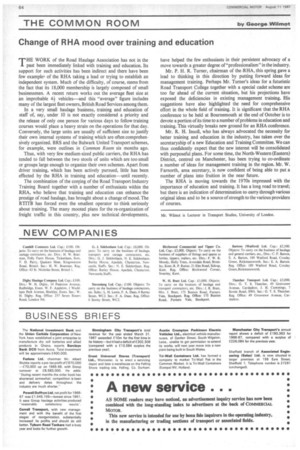Change of RHA mood over training and education
Page 66

If you've noticed an error in this article please click here to report it so we can fix it.
rr HE WORK of the Road Haulage Association has not in the I past been immediately linked with training and education. Its support for such activities has been indirect and there have been few example of the RHA taking a lead or trying to establish an independent system. Much of the difficulty, of course, stems from the fact that its 18,000 membership is largely composed of small businessmen. A recent return works out the average fleet size at an improbable 4+ vehicles—and this "average" figure includes many of the largest fleet owners, British Road Services among them.
In a very small haulage business, training and education of staff of, say, under 10 is not exactly considered a priority and the release of only one person for various days to follow training courses would place a heavy strain on the operations for that day. Conversely, the large units are usually of sufficient size to justify their own internal systems of training which are often comprehensively organized. BRS and the Bulwark United Transport schemes, for example, were outlines in Common Room six months ago.
Thus, with very few medium-sized public carriers, the RHA has tended to fall between the two stools of units which are too small or groups large enough to organize their own schemes. Apart from driver training, which has been actively pursued, little has been effected by the RHA in training and education—until recently.
The combination of the coming of the Road Transport Industry Training Board together with a number of enthusiasts within the RHA, who believe that training and education can enhance the prestige of road haulage, has brought about a change of mood. The RTITB has forced even the smallest operator to think seriously about training. The many mooted plans for the re-organization of freight traffic in this country, plus new technical developments, have helped the few enthusiasts in their persistent advocacy of a move towards a greater degree of "professionalism" in the industry.
Mr. P. H. R. Turner, chairman of the .RHA, this spring gave a lead to thinking in this direction by putting forward ideas for management training. Perhaps Mr. Turner's ideas for a futuristic Road Transport College together with a special cadet scheme are too far ahead of the current situation, but his projections have exposed the deficiencies in existing management training. His suggestions have also highlighted the need for comprehensive effort in the whole field of training. It is significant that the RHA conference to be held at Bournemouth at the end of October is to devote a portion of its time to a number of problems in education and training. This virtually breaks new ground for an RHA conference.
Mr. R. H. Insoll, who has always advocated the necessity for better training and education in the industry, has taken over the secretaryship of a new Education and Training Committee. We can thus confidently expect that the new interest will be consolidated with purposeful plans. For some time, the North-Western (Eastern) District, centred on Manchester, has been trying to co-ordinate a number of ideas for management training in the region. Mr. W. Farriorth, area secretary, is now confident of being able to put a number of plans into fruition in the near future.
The RHA is moving towards the 1970s impressed with the importance of education and training. It has a long road to travel; but there is an indication of determination to carry through various original ideas and to be a source of strength to the various providers of courses.












































































































